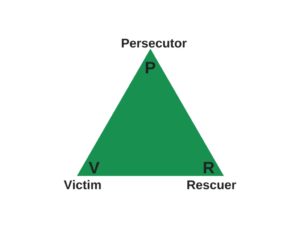The Drama Triangle from the work of Stephen Karpman, 1968, is a useful psychological image and concept, to explain the many ways that we are all pulled into triangles, and how this impacts our children too. Once one is aware of this concept, it is easier to be aware of this dynamic when it happens, and step out of the role of Victim, Prosecutor or Rescuer.
The Three Points of The Drama Triangle
The Persecutor: This is the person whom is perceived as the “attacker”, who may bully, criticize, and be rigid or harsh. However, the persecutor might also be a thing such as a project, a job or a mental health stressor such as anxiety, stress/overwhelm, addiction, ADHD, learning disability, depression etc.
The Victim: This is the person who perceives that he/she is powerless in the face of the persecutor.
The Rescuer: This is the person who wants to protect or save the victim from the prosecutor. The rescuer has positive and heartfelt intentions, but doesn’t realize that by stepping into the role of the rescuer, this causes the triangle to say intact. It reinforces for the victim that he/she is powerless. Over time the rescuer may become exhausted, resentful and co-dependent.
The Drama Triangle & The Importance of Developing Capability
Depending on the situation, we will all find ourselves in a Drama Triangle at different points in our lives and our roles within the triangle will change depending on the circumstances.
With our children, this reminds us of the importance of developing capability as emphasized in Adlerian Parenting Philosophy.
It is important for our children to feel self-empowered vs. insecure as “the victim”. The attachment relationship or connection (as it is called in Adlerian Parenting) is very important, and the foundation, but from there it is essential to develop capability.
Changing the Role of the Rescuer
As parents, partners, and friends it is important to support our loved ones, but not overtly worry about them or try to save them.
We need to provide encouragement and coaching without rescuing.
It is helpful to replace the “R” in the triangle (for Rescuer), with a “C” for coach.
As a coach, we can provide guidance and scaffolding but have the one who is in the role of victim, do as much as possible for him/herself.
When the rescuer removes him/herself as the rescuer, the victim of the drama triangle will feel more empowered to face the persecutor.
Sometimes it may take counselling, such as in the cases of anxiety when it persecutes one member of a family and impacts everyone.
Other times it may be about taking responsibility for one’s choices and knowing that perfectionism is impossible but making different choices is possible.
The victim can figure out a way to step into his/her power and no longer be persecuted, the rescuer can become the coach, and the persecutor, if it’s a person, can learn to be responsible for his/her own feelings versus directing them at the victim.
Every situation is unique, but the first step is awareness and then action can follow.
John Gottman, a well-known couples therapist and researcher, describes four persecuting behaviours to avoid. You can read about them here.
Warmly,
PS. Registration is now open for my next round of Self-Empowerment groups for children ages 7-9yrs. and 10-12 yrs. You can view the flyer here for more information and to register. These groups start Tuesday, November 3rd, 2020 and children can participate online or in-person or a combination of both. I’ve had children from California, Manitoba, Vancouver Island, and even South Carolina, participate via Zoom!
Want to Connect?
Subscribe now to receive free weekly parenting tips and inspiration.








